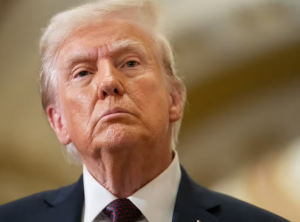Donald Trump would have been convicted of crimes over his failed attempt to cling to power in 2020 but for his victory in last year’s US presidential election, according to the special counsel who investigated him.
Jack Smith’s report detailing his team’s findings about Trump’s efforts to subvert democracy was released by the justice department early on Tuesday.
After the insurrection at the US Capitol on 6 January 2021, Smith was appointed as special counsel to investigate Trump’s efforts to overturn the 2020 election. His investigation culminated in a detailed report submitted to the attorney general, Merrick Garland.
In it, Smith asserts that he believes the evidence would have been sufficient to convict Trump in a trial if his success in the 2024 election had not made it impossible for the prosecution to continue.
“The department’s view that the constitution prohibits the continued indictment and prosecution of a president is categorical and does not turn on the gravity of the crimes charged, the strength of the government’s proof or the merits of the prosecution, which the office stands fully behind,” Smith writes.
“Indeed, but for Mr Trump’s election and imminent return to the presidency, the office assessed that the admissible evidence was sufficient to obtain and sustain a conviction at trial.”
Trump was impeached for his role in spurring the January 6 riot, accused by a congressional panel of taking part in a “multi-part conspiracy” and ultimately indicted by justice department on four counts, including “conspiracy to defraud” the US.
Trump pleaded not guilty to all charges.
After the release, Trump, in a post on his Truth Social site, called Smith a “lamebrain prosecutor who was unable to get his case tried before the election”.
He has depicted the cases as politically motivated attempts to damage his campaign and political movement. He also calculated correctly that he could outrun the law by staging a spectacular political comeback and regaining the White House.
Volume one of Smith’s report meticulously outlines Trump’s alleged actions, including his efforts to pressure state officials, assemble alternate electors and encourage supporters to protest against the election results.
Smith writes: “Significantly, he made election claims only to state legislators and executives who shared his political affiliation and were his political supporters, and only in states that he had lost.”
The report underscores Trump’s persistent spreading of “demonstrably and, in many cases, obviously false” claims about the 2020 election. These served as the basis for his pressure campaign and contributed to the January 6 attack.
Much of the evidence cited in the report has been made public previously. But it includes some new details, such as that prosecutors considered charging Trump with inciting the January 6 attack on the Capitol under a US law known as the Insurrection Act.
Prosecutors ultimately concluded that such a charge posed legal risks and there was insufficient evidence that Trump intended for the “full scope” of violence during the riot, a failed attempt by a mob of his supporters to stop Congress from certifying the 2020 election.
The indictment charged Trump with conspiring to obstruct the election certification, defraud the US of accurate election results and deprive US voters of their voting rights.
Smith’s office determined that charges may have been justified against some co-conspirators accused of helping Trump carry out the plan, but the report said prosecutors reached no final conclusions. Several of Trump’s former lawyers had previously been identified as co-conspirators referenced in the indictment.
Trump and his legal team have characterised the report as a “political hit job” aimed at disrupting the presidential transition and waged a protracted legal battle to prevent its release.
Smith, who left the justice department last week, directly addresses accusations from Trump and his allies that the investigation was politically motivated. He asserts that his team operated solely on the basis of facts and law.
Smith writes: “My office had one north star: to follow the facts and law wherever they led. Nothing more and nothing less. To all who know me well, the claim from Mr Trump that my decisions as a prosecutor were influenced or directed by the Biden administration or other political actors is, in a word, laughable.”
Smith acknowledges the justice department’s policy prohibiting the prosecution of a sitting president, a factor that ultimately led to the dropping of charges against Trump after his 2024 victory. The report also references a supreme court ruling expanding presidential immunity, which complicated the case.
But Smith wrote in a letter to Garland attached to the report: “While we were not able to bring the cases we charged to trial, I believe the fact that our team stood up for the rule of law matters. I believe the example our team set for others to fight for justice without regard for the personal costs matters.”
A second section of the report details Smith’s case accusing Trump of illegally retaining sensitive national security documents after leaving the White House in 2021. The justice department has committed not to make that portion public while legal proceedings continue against two Trump associates charged in the case.
Trump, who will be inaugurated as the 47th president on Monday, was last week sentenced to an unconditional discharge for 34 felony counts of falsifying business records related to a hush-money payment during the 2016 election.
THE GUARDAIN

